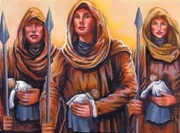Ji'e'toh is the complex system of honor that the Aiel follow. Ji'e'toh determines all interactions in Aiel life; fighting, housing, even intimate relationships and marriage. The term is from the Old Tongue and means, literally, honor and obligation.
Ji is honor, and toh is obligation. The greatest ji comes from touching an armed enemy in battle without harming them. This incurs a great deal of toh upon the enemy, and the person who is touched usually becomes gai'shain, which in the Old Tongue means "pledged to peace in battle." The person who becomes gai'shain does so, not only to fulfill his "toh" but to reduce the "ji" of the person he becomes gai'shain to.
A gai'shain serves his or her captor for a year and a day, touching no weapon, doing no battle, and wearing only white. Wise Ones, blacksmiths, women with a child under the age of ten, and those under the age of 16 may not be made gai'shain.
The least amount of ji comes from killing an enemy, as the Aiel believe that killing is far easier than disarming or capturing an opponent.

Maidens meeting their toh by carrying dolls
Under ji'e'toh shaming acts incur obligation (toh) towards someone or oneself. Only the one committing the act can know the degree of shame (or obligation) incurred. Once met, there is no shame in having had toh.
Toh can be met by being gai'shain, enduring physical punishment, or performing shameful or trivial labor depending on how it was incurred. The more toh incurred, the more harsh or shameful the punishment must be to meet it.
Examples of shaming acts:
- Reminding or asking gai'shain of their life before putting on white. Being gai'shain is a kind of parenthesis in an Aiel's life, so reminding gai'shain of their earlier life is reminding them of the shame that brought them to their station. As gai'shain are considered noncombatants mistreating them in any way, even by prompting them to remember their previous life, is shameful and thus incurs great toh.
- Asking publicly if you have toh. Asking means that you don't know or understand your shame, which is doubly shameful.
- Reminding someone of toh they have already met. After meeting toh, there is no shame or obligation from what incurred it. Reminding someone of their previous shame (for instance, by talking of their time as gai'shain) incurs toh toward them.
Ji'e'toh is not a monolithic set of rules to be followed blindly. Sometimes what needs to be done would be against ji'e'toh. Committing such an act does not go against ji'e'toh so long as toh incurred is met afterward.
Encompassing duty and custom, law and life, all Aiel live by this honor system. Following ji'e'toh is what defines an Aiel, as demonstrated by Egwene al'Vere during her apprenticeship to the Wise Ones in Cairhien. The Wise One Sorilea told her she had the "heart of an Aiel" because she understood ji'e'toh and met the obligations she had toward the Aiel.
Among the wetlanders, Sashalle Anderly, also apprenticed to Aiel Wise Ones, might also understand ji'e'toh.
Wetlanders typically struggle to understand ji'e'toh, and therefore struggle to understand Aiel.